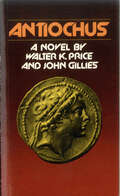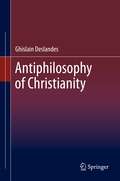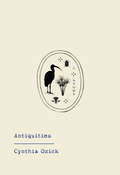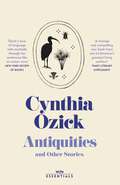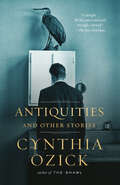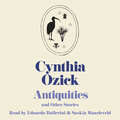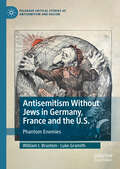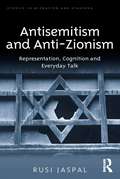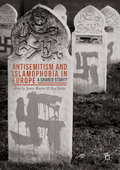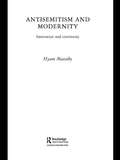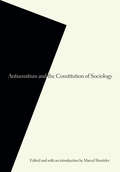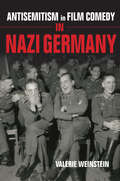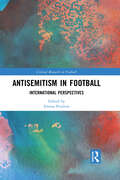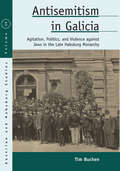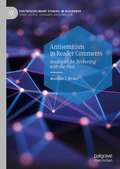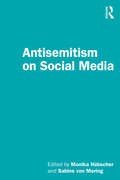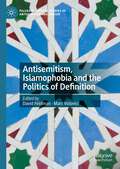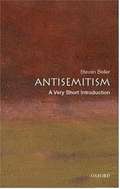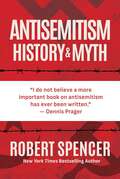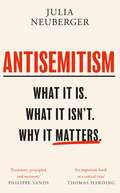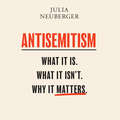- Table View
- List View
Antiochus: A Novel
by John Gillies Walter PriceHe was one of the most notorious persecutors of the Jews who ever lived. He defiled the Temple of God, killed religious zealots, and became the archetype of the Antichrist.The Greek monarch, King Antiochus IV Epiphanes, ruled the ancient Seleucid Empire 2200 years ago. The authors have written the story of his reign and find an extremely revealing relationship between this mysterious personality and certain events that the Bible indicates are yet to come to pass.An important evil figure in Bible prophecy comes to life in Antiochus.
Antiochus: A Novel
by John Gillies Walter PriceHe was one of the most notorious persecutors of the Jews who ever lived. He defiled the Temple of God, killed religious zealots, and became the archetype of the Antichrist.The Greek monarch, King Antiochus IV Epiphanes, ruled the ancient Seleucid Empire 2200 years ago. The authors have written the story of his reign and find an extremely revealing relationship between this mysterious personality and certain events that the Bible indicates are yet to come to pass.An important evil figure in Bible prophecy comes to life in Antiochus.
Antiphilosophy of Christianity
by Ghislain DeslandesThis text presents and addresses the philosophical movement of antiphilosophy working thru the texts of Christian thinkers such as Pascal and Kierkegaard. The author as influenced by Alain Badiou, portrays these Christian thinkers as of a subjective dimension negating the possibility of an objective quest for truth. The claim here is that antiphilosophy is abundant in the eyes of these two thinkers who frame the thought event as represented by Christianity, ultimately resigning itself to more or less the opposite of philosophy itself. Readers will discover why philosophical reason should never be convinced by that which denies its very authority.Subjecting faith to the perils of philosophical analysis, confronting the philosophical tradition with the truth of the Christian faith, and occupying the space between the two: such are the challenges facing an antiphilosophy of Christianity. This text will appeal to researchers and students working in continental philosophy, philosophy of religion and those in religious studies who want to investigate the links between Christianity and antiphilosophy.
Antiquities
by Cynthia OzickFrom one of our most preeminent writers, a tale that captures the shifting meanings of the past, and how our experience colors those meanings.Lloyd Wilkinson Petrie, one of the seven elderly trustees of the now defunct (for thirty-four years) Temple Academy for Boys, is preparing a memoir of his days at the school, intertwined with the troubling distractions of present events. As he navigates, with faltering recall, between the subtle anti-Semitism that pervaded the school's ethos and his fascination with his own family's heritage--in particular, his illustrious cousin, the renowned archaeologist Sir William Matthew Flinders Petrie--he reconstructs the passions of a childhood encounter with the oddly named Ben-Zion Elefantin, a mystifying older pupil who claims descent from Egypt's Elephantine Island. From this seed emerges one of Cynthia Ozick's most wondrous tales, touched by unsettling irony and the elusive flavor of a Kafka parable, and weaving, in her own distinctive voice, myth and mania, history and illusion.
Antiquities (W&N Essentials)
by Cynthia OzickIn 1949, Lloyd Wilkinson Petrie has returned as a Trustee to live in the long-defunct boarding school that he had attended as a child. There he is preparing a memoir.He writes, with faltering recall, of the subtle anti-Semitism that pervaded the school's ethos and of his fascination with the Egyptian archaeological adventures of his distant cousin, Sir William Matthew Flinders Petrie. Memories return too of the passions of a boyhood friendship with named Ben-Zion Elefantin, a mystifying older pupil who claims descent from Egypt's Elephantine Island.From one of our greatest writers, this is a tale that captures the shifting meanings of the past - one that displays her delight in Jamesian irony and the mythical flavor of a Kafka parable, woven into her own distinct voice.
Antiquities and Other Stories (Vintage International Ser.)
by Cynthia OzickFrom one of our most preeminent writers, a tale that captures the shifting meanings of the past and how our experience colors those meanings, now alongside four previously uncollected storiesIn Antiquities, Lloyd Wilkinson Petrie, one of the seven elderly trustees of the now-defunct (for thirty-four years) Temple Academy for Boys, is preparing a memoir of his days at the school, intertwined with the troubling distractions of present events. As he navigates, with faltering recall, between the subtle anti-Semitism that pervaded the school's ethos and his fascination with his own family's heritage--in particular, his illustrious cousin, the renowned archaeologist Sir William Matthew Flinders Petrie--he reconstructs the passions of a childhood encounter with the oddly named Ben-Zion Elefantin, a mystifying older pupil who claims descent from Egypt's Elephantine Island. Included alongside this wondrous tale, touched by unsettling irony and with the elusive flavor of a Kafka parable, are four additional stories in Cynthia Ozick's brilliant, distinctive voice, weaving myth and mania, history and illusion: The Coast of New Zealand, The Bloodline of the Alkanas, Sin, and A Hebrew Sibyl.
Antiquities and Other Stories (W&N Essentials)
by Cynthia Ozick'A writer innately drawn to paradox, and to the moral questions inherent in the relationships between richness and poverty, mind and body, history and imagination' Ali Smith'As cunning and rich as anything Ozick's written' Wall Street Journal'One of our era's central writers. About a man ensnared by history, Antiquities is at once a warning against the hazards of nostalgia and an invitation to take a longer view of how we got to where we are' The New Yorker'Ozick's prose urges the breathless reader along, her love of language rolling excitedly through her sentences like an ocean wave' New York Review of BooksI remember nothing. I remember everything. I believe everything. I believe nothing. In 1949, Lloyd Wilkinson Petrie returns as a Trustee to the long-defunct boarding school that he attended as a child. There he is preparing a memoir about the subtle anti-Semitism that pervaded the school, about his fascination with the Egyptian archaeological adventures of his distant cousin, about the passions of a boyhood friendship with named Ben-Zion Elefantin, a mystifying older pupil.In this novella, and the three stories published alongside it, one of our most preeminent writers weaves together myth and mania, history and illusion to capture the shifting meanings of the past.A W&N Essential
Antisemitic Myths: A Historical and Contemporary Anthology
by Marvin Perry Frederick M. SchweitzerThis anthology presents 90 documents that focus on the nature, evolution and meaning of the principle myths that have made anti-Semitism such a lethal force in history: Jews as deicides, ritual murderers, agents of Satan, international conspirators, and conniving, unscrupulous Shylocks.
Antisemitism Without Jews in Germany, France and the U.S.: Phantom Enemies (Palgrave Critical Studies of Antisemitism and Racism)
by William I. Brustein Luke GramithWhy does antisemitic messaging strike a chord in certain communities without Jews but fall flat in neighboring communities equally without Jews? This book focuses on antipathy towards Jews - expressed through successful electoral campaigns where a candidate or political party championed antisemitism - in communities located in three different nations where the Jewish population had virtually no history of interaction with the resident majority population of non-Jews. The cases are: the election of antisemitic deputies in the 1893 German Reichstag Elections from eastern Saxony; the election of a slate of antisemitic deputies to the French Chamber in 1898 from the southwestern French department of the Gers; and the significant proportion of votes for the antisemitic campaign of Gerald B. Winrod in the U.S. Senate Republican Party primary election in 1938 in Kansas. Each of these examples illustrates the existence of heightened levels of antisemitism in cases where few, if any, Jews had engagement with the majority population.
Antisemitism and Anti-Zionism: Representation, Cognition and Everyday Talk (Studies in Migration and Diaspora)
by Rusi JaspalAntisemitism and anti-Zionism are complex, delineable, yet inter-related social-psychological phenomena. While antisemitism has been described as an irrational, age-old prejudice, anti-Zionism is often represented as a legitimate response to a ’rogue state’. Drawing upon media and visual sources and rich interview data from Iran, Britain and Israel, Antisemitism and Anti-Zionism: Representation, Cognition and Everyday Talk examines the concepts of antisemitism and anti-Zionism, tracing their evolution and inter-relations, and considering the distinct ways in which they are manifested, and responded to, by Muslim and Jewish communities in Iran, Britain and Israel. Providing insights from social psychology, sociology and history, this interdisciplinary analysis sheds light on the pivotal role of the media, social representations and identity processes in shaping antisemitism and anti-Zionism. As such, this provocative book will be of interest to social scientists working on antisemitism, race and ethnicity, political sociology and political science, media studies and Middle Eastern politics.
Antisemitism and Islamophobia in Europe: A Shared Story?
by James Renton Ben GidleyThis is the first book to examine the relationship between European antisemitism and Islamophobia from the Crusades until the twenty-first century in the principal flashpoints of the two racisms. With case studies ranging from the Balkans to the UK, the contributors take the debate away from politicised polemics about whether or not Muslims are the new Jews. Much previous scholarship and public discussion has focused on comparing European ideas about Jews and Judaism in the past with contemporary attitudes towards Muslims and Islam. This volume rejects this approach. Instead, it interrogates how the dynamic relationship between antisemitism and Islamophobia has evolved over time and space. The result is the uncovering of a previously unknown story in which European ideas about Jews and Muslims were indeed connected, but were also ripped apart. Religion, empire, nation-building, and war, all played their part in the complex evolution of this relationship. As well as a study of prejudice, this book also opens up a new area of inquiry: how Muslims, Jews, and others have responded to these historically connected racisms. The volume brings together leading scholars in the emerging field of antisemitism-Islamophobia studies who work in a diverse range of disciplines: anthropology, history, sociology, critical theory, and literature. Together, they help us to understand a Europe in which Jews and Arabs were once called Semites, and today are widely thought to be on two different sides of the War on Terror.
Antisemitism and Modernity: Innovation and Continuity (Routledge Jewish Studies Series)
by Hyam MaccobyThe subject of anti-Semitism, not long ago thought to be a dead issue, has been revised due to the conflict between Israel and the Palestinians. Maccoby traces the now topical discussion of the origins of Anti-Semitism, and especially its development in the modern world. The key questions that are addressed include: How is it that this medieval prejudice proved so lasting and potent? Are the roots of anti-Semitism religious? If so, how do these roots differ in Christianity and Islam? By what means did it bridge the gap between medievalism and Enlightenment? How was it that many of the most respected Enlightenment figures (such as Voltaire) dedicated as they were to tolerance and pluralism, retained a virulent anti-Semitism? These questions, and many more, are dealt with as Maccoby explores the roots of the anti-Semitism, tracing it from its origins, and shows how it has changed in accordance with the shifting ideas of the modern world but without changing in its essence. Antisemitism and Modernity is essential reading for those with interests in the development of anti-Semitism, its manifestation in the current world and its future.
Antisemitism and the Constitution of Sociology
by Marcel StoetzlerModern antisemitism and the modern discipline of sociology not only emerged in the same period, but—antagonism and hostility between the two discourses notwithstanding—also overlapped and complemented each other. Sociology emerged in a society where modernization was often perceived as destroying unity and “social cohesion.” Antisemitism was likewise a response to the modern age, offering in its vilifications of “the Jew” an explanation of society’s deficiencies and crises. Antisemitism and the Constitution of Sociology is a collection of essays providing a comparative analysis of modern antisemitism and the rise of sociology. This volume addresses three key areas: the strong influence of writers of Jewish background and the rising tide of antisemitism on the formation of sociology; the role of antisemitism in the historical development of sociology through its treatment by leading figures in the field, such as Emile Durkheim, Talcott Parsons, and Theodor W. Adorno; and the discipline’s development in the aftermath of the Nazi Holocaust. Together the essays provide a fresh perspective on the history of sociology and the role that antisemitism, Jews, fascism, and the Holocaust played in shaping modern social theory.
Antisemitism in Film Comedy in Nazi Germany
by Valerie WeinsteinToday many Germans remain nostalgic about "classic" film comedies created during the 1930s, viewing them as a part of the Nazi era that was not tainted with antisemitism. In Antisemitism in Film Comedy in Nazi Germany, Valerie Weinstein scrutinizes these comic productions and demonstrates that film comedy, despite its innocent appearance, was a critical component in the effort to separate "Jews" from "Germans" physically, economically, and artistically. Weinstein highlights how the German propaganda ministry used directives, pre- and post-production censorship, financial incentives, and influence over film critics and their judgments to replace Jewish "wit" with a slower, simpler, and more direct German "humor" that affirmed values that the Nazis associated with the Aryan race. Through contextualized analyses of historical documents and individual films, Weinstein reveals how humor, coded hints and traces, absences, and substitutes in Third Reich film comedy helped spectators imagine an abstract "Jewishness" and a "German" identity and community free from the former. As resurgent populist nationalism and overt racism continue to grow around the world today, Weinstein’s study helps us rethink racism and prejudice in popular culture and reconceptualize the relationships between film humor, national identity, and race.
Antisemitism in Football: International Perspectives (Critical Research in Football)
by Emma PoultonThis book investigates the nature and prevalence of expressions of antisemitism within the context of football in Europe and beyond, as well as attempts to challenge and combat this problematic phenomenon. Drawing on empirical research, the book presents a series of case studies of countries in which both football and antisemitism have been prominent, including England, Italy, Germany, Holland, Poland, Argentina and Hungary. Each chapter explains the historical context of why antisemitism prevails in their country and their country’s football culture; considers those football clubs with a ‘Jewish’ heritage and identity (which tend to be the catalyst for antisemitic abuse); and critically examines the measures being taken in that country to tackle antisemitism in football by organisations including governing bodies, campaign groups, supporter groups and football clubs themselves. No other book has looked as deeply into this highly topical issue which continues to blight contemporary football. Antisemitism in Football is important reading for anybody with an interest in football, fan cultures, the sociology of sport, Jewish studies, antisemitism and other forms of racism and discrimination in society.
Antisemitism in Galicia: Agitation, Politics, and Violence against Jews in the Late Habsburg Monarchy (Austrian and Habsburg Studies #29)
by Tim BuchenIn the last third of the nineteenth century, the discourse on the “Jewish question” in the Habsburg crownlands of Galicia changed fundamentally, as clerical and populist politicians emerged to denounce the Jewish assimilation and citizenship. This pioneering study investigates the interaction of agitation, violence, and politics against Jews on the periphery of the Danube monarchy. In its comprehensive analysis of the functions and limitations of propaganda, rumors, and mass media, it shows just how significant antisemitism was to the politics of coexistence among Christians and Jews on the eve of the Great War.
Antisemitism in Galicia: Agitation, Politics, and Violence against Jews in the Late Habsburg Monarchy (Austrian and Habsburg Studies #29)
by Tim BuchenIn the last third of the nineteenth century, the discourse on the “Jewish question” in the Habsburg crownlands of Galicia changed fundamentally, as clerical and populist politicians emerged to denounce the Jewish assimilation and citizenship. This pioneering study investigates the interaction of agitation, violence, and politics against Jews on the periphery of the Danube monarchy. In its comprehensive analysis of the functions and limitations of propaganda, rumors, and mass media, it shows just how significant antisemitism was to the politics of coexistence among Christians and Jews on the eve of the Great War.
Antisemitism in Reader Comments: Analogies for Reckoning with the Past (Postdisciplinary Studies in Discourse)
by Matthias J. BeckerThis book examines the most frequent form of Jew-hatred: Israel-related antisemitism. After defining this hate ideology in its various manifestations and the role the internet plays in it, the author explores the question of how Israel-related antisemitism is communicated and understood through the language used by readers in below-the-line comments. Drawing on a corpus of over 6,000 comments from traditionally left-wing news outlets The Guardian and Die Zeit, the author examines both implicit and explicit comparisons made between modern-day Israel and both colonial Britain and Nazi Germany. His analyses are placed within the context of resurgent neo-nationalism in both countries, and it is argued that these instances of antisemitism perform a multi-faceted role in absolving guilt, re-writing history, and reinforcing in-group status. This book will be of interest not only to linguistics scholars, but also to academics in fields such as internet studies, Jewish studies, hate speech and antisemitism.
Antisemitism on Social Media
by Monika Hübscher and Sabine von MeringAntisemitism on Social Media is a book for all who want to understand this phenomenon. Researchers interested in the matter will find innovative methodologies (CrowdTangle or Voyant Tools mixed with discourse analysis) and new concepts (tertiary antisemitism, antisemitic escalation) that should become standard in research on antisemitism on social media. It is also an invitation to students and up-and-coming and established scholars to study this phenomenon further. This interdisciplinary volume addresses how social media with its technology and business model has revolutionized the dissemination of antisemitism and how this impacts not only victims of antisemitic hate speech but also society at large. The book gives insight into case studies on different platforms such as Twitter, Facebook, TikTok, YouTube, and Telegram. It also demonstrates how social media is weaponized through the dissemination of antisemitic content by political actors from the right, the left, and the extreme fringe, and critically assesses existing counter-strategies. People working for social media companies, policy makers, practitioners, and journalists will benefit from the questions raised, the findings, and the recommendations. Educators who teach courses on antisemitism, hate speech, extremism, conspiracies, and Holocaust denial but also those who teach future leaders in computer technology will find this volume an important resource.
Antisemitism, Islamophobia and the Politics of Definition (Palgrave Critical Studies of Antisemitism and Racism)
by David Feldman Marc VoloviciThis book, the first to explore the politics of definitions from an interdisciplinary perspective, encourages readers to reconsider the value and limits of definitions in confronting antisemitism and Islamophobia. In recent years, definitions of antisemitism and Islamophobia have become central to the struggle to combat the hostility, harassment and discrimination experienced by Jews and Muslims. Yet these definitions have also provoked fierce controversy: critics have questioned whether they are fit for purpose, or have criticised them as unwelcome attempts to restrict freedom of expression. In this edited collection, historians, social scientists and philosophers reflect on definitions of antisemitism and Islamophobia in both the past and the present. Its contributors investigate the different historical contexts which have shaped definitions and examine their different political purposes and meanings, as well as addressing contemporary debates, and identifying ways for us to move beyond our current impasse. This book therefore provides a broad and new perspective from which to comprehend present day minority politics.
Antisemitism: A Very Short Introduction
by Steven BellerThis Very Short Introduction examines and untangles the various strands of antisemitism seen throughout history, from medieval religious conflict to 'new' antisemitism in the 21st century. Steven Beller reveals how the phenomenon grew as a political and ideological movement in the 19th century, how it reached it its dark apogee in the worst genocide in modern history - the Holocaust - and how antisemitism still persists around the world today.
Antisemitism: History and Myth
by Robert SpencerWhy the ancient evil of antisemitism has returned—and how to counter it. &“Had we listened to Robert Spencer and taken heed twenty years ago or even ten years ago, the impact of the Islamists driven antisemitism would not have caught us by surprise. We would have had in place an institutional effort to counter it. &“Here is another opportunity to pay attention to his important work. Read this book!&” –Ayaan Hirsi AliThe Hamas attack upon Israel on October 7, 2023, was one of the most inhuman jihad attacks ever. The attackers gloried in their savagery and vied to outdo one another in cruelty. Yet despite—or perhaps because of—its brutality, that attack unleashed expressions of hatred for Jews that shocked those who assumed such hate was a thing of the past. Global public opinion turned sharply against Israel. One campus protester carried a sign calling for a &“Final Solution.&” Another published a video saying, &“Be glad—be grateful—that I&’m not just going out and murdering Zionists.&” Synagogues all over the US received bomb threats. Jews in Europe and the US were attacked. October 7 also led to a large-scale reappearance of claims about the Jews&’ secret power and malevolence. Claims that Jews are enemies of all that is good have become mainstream as they have not been since Hitler put a bullet in his brain. The record needs to be set straight for anyone who is willing to see the truth. Historian Robert Spencer does just that. He reveals the sources of today&’s Jew-hatred in pre-Christian paganism, Christianity, Islam, and national and international socialism, and rebuts the most common claims against Jews. The resurgence of antisemitism should worry everyone, Jewish and non-Jewish, who is concerned about the recurrence of one of the darkest chapters in human history. The world today is on the brink of returning to such barbarism. Antisemitism: History and Myth is an attempt to keep that from happening.
Antisemitism: What It Is. What It Isn't. Why It Matters
by Julia NeubergerAntisemitism has been on the rise in recent years, with violent attacks, increased verbal insults, and an acceptability in some circles of what would hitherto have been condemned as outrageous antisemitic discourse. Yet despite the dramatic increase in debate and discussion around antisemitism, many of us remain confused. In this urgent and timely book, Rabbi Julia Neuberger uses contemporary examples, along with historical context, to unpack what constitutes antisemitism, building a powerful argument for why it is so crucial that we come to a shared understanding now.
Antisemitism: What It Is. What It Isn't. Why It Matters
by Julia NeubergerThere has been a disturbing rise in antisemitism in Europe over the last fifteen years or so, with violent attacks on Jewish targets, increased verbal antisemitism, and an acceptability in many circles of what would hitherto have been condemned as outrageous antisemitic discourse. More recently, the Labour party have come under fire for engaging in antisemitic abuse. Yet despite the dramatic increase in debate and discussion around antisemitism, there is a general sense of confusion about what should and shouldn't be defined as antisemitism - and particularly around criticism of the State of Israel.In this urgently needed book, Rabbi Julia Neuberger uses contemporary examples, along with historical context, to unpack what constitutes antisemitism, building a powerful argument for why it is so crucial that we come to a shared understanding now, and exploring ways of dealing with it.
Antisemitism: What It Is. What It Isn't. Why It Matters
by Julia NeubergerThere has been a disturbing rise in antisemitism in Europe over the last fifteen years or so, with violent attacks on Jewish targets, increased verbal antisemitism, and an acceptability in many circles of what would hitherto have been condemned as outrageous antisemitic discourse. More recently, the Labour party have come under fire for engaging in antisemitic abuse. Yet despite the dramatic increase in debate and discussion around antisemitism, there is a general sense of confusion about what should and shouldn't be defined as antisemitism - and particularly around criticism of the State of Israel.In this urgently needed book, Rabbi Julia Neuberger uses contemporary examples, along with historical context, to unpack what constitutes antisemitism, building a powerful argument for why it is so crucial that we come to a shared understanding now, and exploring ways of dealing with it.
